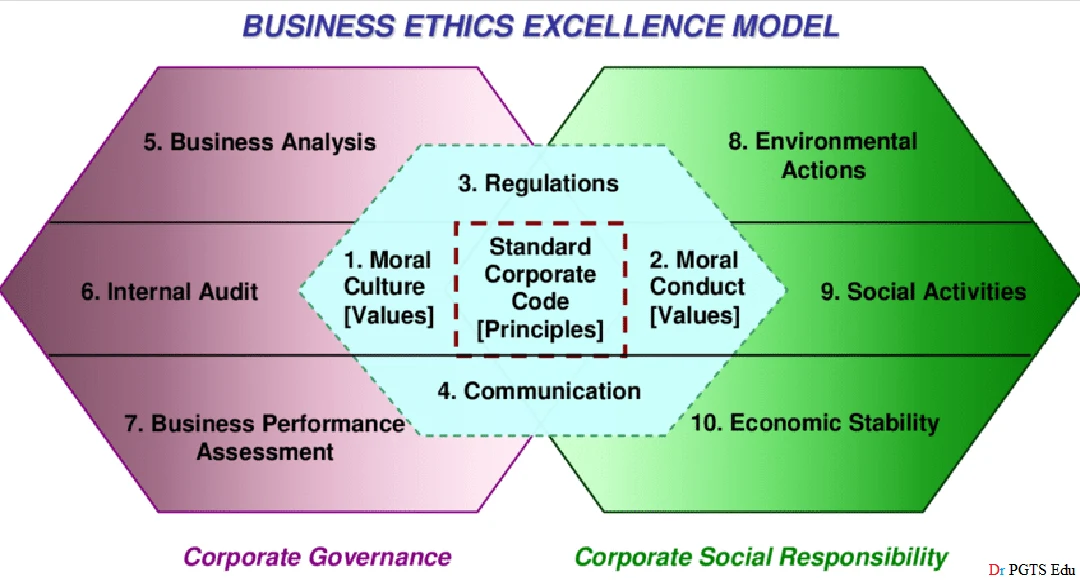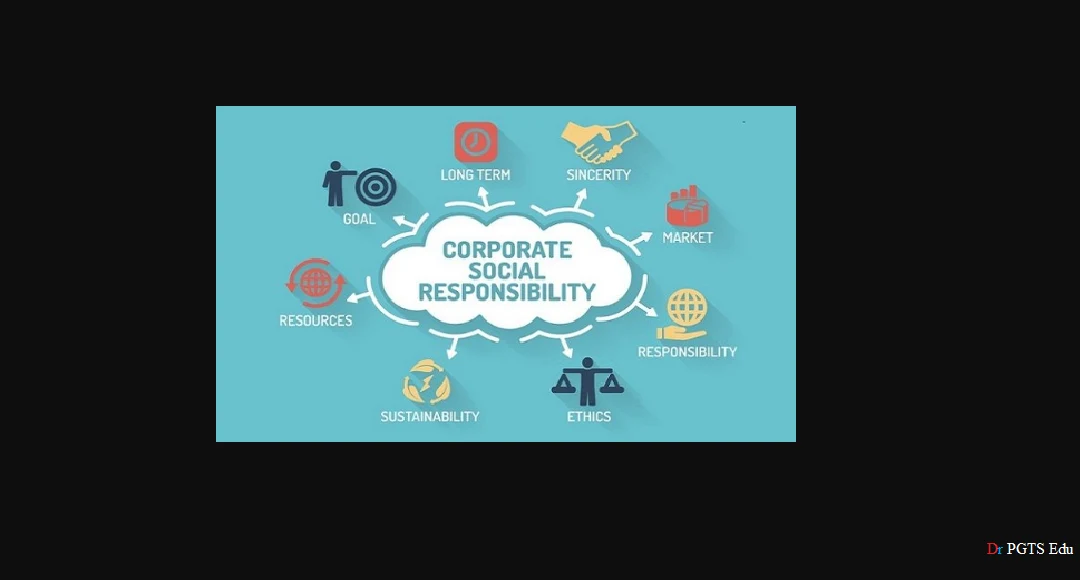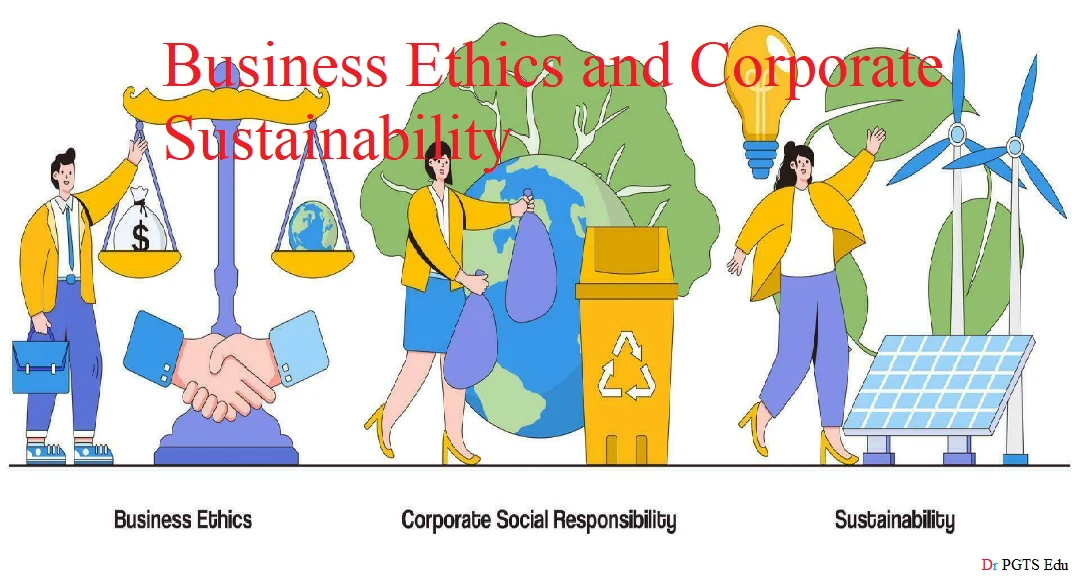Business Ethics and Corporate Sustainability in today’s global economy, understanding Business Ethics and Corporate Sustainability is vital for organizations aiming to achieve long-term success while maintaining integrity and responsibility. This article provides a comprehensive guide for beginners on the features, functions, types, merits, and demerits of business ethics, along with an exploration of ethical issues in India.
Business Ethics: Meaning and Definition
Business Ethics refers to the application of moral principles and values in business decision-making. It encompasses the conduct of individuals and organizations in their commercial activities, ensuring fairness, transparency, and social responsibility.
Nature of Business Ethics
- Normative Science: Business ethics establishes moral guidelines for decision-making.
- Dynamic and Evolving: It adapts to societal changes and technological advancements.
- Universal Application: Relevant to all industries and sectors.
- Protection of Stakeholders’ Interests: Focuses on the well-being of employees, customers, and the community.
- Compliance with Legal and Regulatory Frameworks: Ensures adherence to laws and standards.
Role and Importance of Business Ethics and Values in Business
- Enhancing Reputation and Brand Image: Ethical conduct fosters customer trust and loyalty.
- Employee Satisfaction and Retention: Promotes a positive work environment and reduces turnover.
- Risk Management: Minimizes legal and financial risks associated with unethical practices.
- Sustainable Growth: Ensures long-term profitability and environmental responsibility.
- Social Responsibility: Contributes to community development and welfare.
Causes of Unethical Behavior
- Greed and Profit Maximization: Prioritizing short-term gains over ethical practices.
- Lack of Awareness and Training: Insufficient understanding of ethical standards.
- Peer Pressure and Competition: Yielding to competitive pressures.
- Weak Regulatory Frameworks: Inadequate enforcement of laws and regulations.
- Cultural and Ethical Diversity: Differing moral standards across regions.
Ethical Issues in India
- Corruption and Bribery: Prevalent in public and private sectors.
- Labor Exploitation and Child Labor: Violations of labor rights and fair wages.
- Environmental Degradation: Non-compliance with environmental regulations.
- Corporate Governance: Lack of transparency and accountability.
- Consumer Protection: Misleading advertisements and substandard products.
Corporate Sustainability
Corporate Sustainability focuses on balancing economic growth, social responsibility, and environmental stewardship. It aims to create long-term value for stakeholders while minimizing negative impacts on society and the planet.
Features of Corporate Sustainability
- Triple Bottom Line Approach: Economic, social, and environmental performance.
- Stakeholder Engagement: Involvement of employees, customers, and communities.
- Resource Efficiency: Minimizing waste and energy consumption.
- Innovation and Technology Adoption: Implementing sustainable solutions.
- Compliance with Global Standards: Adhering to international sustainability frameworks.
Functions of Corporate Sustainability
- Risk Management: Identifying and mitigating environmental and social risks.
- Corporate Social Responsibility (CSR): Supporting community initiatives.
- Sustainable Supply Chain Management: Ethical sourcing and fair labor practices.
- Environmental Conservation: Reducing carbon footprint and waste.
- Transparency and Reporting: Disclosing sustainability performance.
Types of Corporate Sustainability
- Environmental Sustainability: Protecting natural resources and ecosystems.
- Social Sustainability: Promoting equality and human rights.
- Economic Sustainability: Ensuring profitability and financial stability.
Merits of Business Ethics and Corporate Sustainability
- Enhanced Reputation and Customer Trust
- Increased Employee Morale and Productivity
- Reduced Legal and Regulatory Risks
- Access to Capital and Investment Opportunities
- Positive Impact on Society and Environment
Demerits of Business Ethics and Corporate Sustainability
- High Implementation Costs
- Complexity in Compliance and Reporting
- Resistance to Change from Stakeholders
- Difficulty in Measuring Impact
- Potential Competitive Disadvantage in Certain Markets
Business Ethics and Corporate Sustainability are essential for achieving long-term success and social responsibility. By adhering to ethical principles and sustainable practices, businesses can build trust, enhance reputation, and contribute positively to society and the environment. Addressing ethical issues and promoting responsible behavior will help create a more equitable and sustainable future.
Ethical Theories:
Understanding Business Ethics and Corporate Sustainability through ethical theories is essential for making responsible decisions in the corporate world. This article provides a beginner-friendly guide to ethical decision-making, including traditional ethical theories and their application in business settings.
Ethical Decision-Making
Ethical decision-making involves choosing actions that align with moral principles and values while considering the impact on stakeholders and society.

Decision-Making (Normal Dilemmas and Problems)
- Identifying the Dilemma: Recognize the ethical issue at hand.
- Gathering Information: Assess the facts and stakeholders involved.
- Evaluating Options: Analyze possible actions and their consequences.
- Making a Decision: Choose the most ethical course of action.
- Implementing the Decision: Take action and monitor the outcome.
- Reflecting on the Outcome: Assess the effectiveness and ethical integrity of the decision.
Application of Ethical Theories in Business
Ethical theories provide frameworks for evaluating moral choices and guiding business conduct. These theories help businesses maintain integrity and social responsibility.
Traditional Ethical Theories
- Utilitarianism: Focuses on the greatest good for the greatest number. Businesses following this theory aim to maximize benefits and minimize harm to stakeholders.
- Ethical Egoism: Prioritizes self-interest while considering the long-term impact on others. This approach can drive innovation and profitability but may lead to ethical conflicts.
- Ethics of Duties (Deontology): Emphasizes following moral rules and duties regardless of consequences. This theory promotes honesty, fairness, and justice in business operations.
Normative Theories of Business Ethics
- Stakeholder Theory: Advocates for balancing the interests of all stakeholders, including employees, customers, suppliers, and the community.
- Stockholder Theory: Focuses on maximizing shareholder value while adhering to legal and ethical standards.
Lawrence Kohlberg’s Theory of Moral Development
Kohlberg’s theory explains the stages of moral development that influence ethical decision-making in business:
- Pre-conventional Level: Driven by self-interest and avoiding punishment.
- Conventional Level: Focuses on social approval and maintaining law and order.
- Post-conventional Level: Based on personal ethical principles and justice.
Merits of Applying Ethical Theories in Business
- Enhanced Corporate Reputation
- Increased Employee Morale and Retention
- Improved Customer Trust and Loyalty
- Reduced Legal and Regulatory Risks
- Long-term Sustainability and Profitability
Demerits of Applying Ethical Theories in Business
- Complexity in Balancing Stakeholder Interests
- Potential Conflict Between Profitability and Ethics
- High Costs of Implementing Ethical Practices
- Resistance to Change from Employees and Management
- Difficulty in Measuring Ethical Impact
Moral Issues in Business:
In the realm of Business Ethics and Corporate Sustainability, understanding moral issues is crucial for responsible decision-making and sustainable growth. This article explores moral issues in business, whistle-blowing, and ethical concerns in key functional areas such as marketing, finance, human resources, and environmental protection.
Moral Issues in Business
Moral issues in business revolve around the principles of fairness, honesty, and responsibility in corporate practices. These issues affect stakeholder relationships and the overall integrity of an organization.
Importance of Moral Issues and Reasoning
- Building Trust and Reputation: Ethical conduct enhances customer and investor trust.
- Compliance with Legal Standards: Prevents legal disputes and penalties.
- Promoting Fairness and Equality: Ensures fair treatment of employees and customers.
- Enhancing Employee Morale: Fosters a positive work environment.
- Sustainable Growth: Supports long-term profitability and social responsibility.
Whistle-Blowing
Whistle-blowing involves reporting unethical or illegal practices within an organization.
Kinds of Whistle-Blowing
- Internal Whistle-Blowing: Reporting misconduct within the organization.
- External Whistle-Blowing: Reporting to regulatory authorities or the media.
- Personal Whistle-Blowing: Reporting unethical behavior that directly affects the individual.
- Impersonal Whistle-Blowing: Reporting for the benefit of the organization or society.
Ethical Issues in Functional Areas of Business
Marketing and Advertising
- Truth in Advertising: Providing accurate and non-misleading information.
- Manipulation and Coercion: Avoiding deceptive tactics to influence consumer behavior.
- Trade Secrets: Protecting proprietary information while maintaining transparency.
- Corporate Disclosure: Ensuring transparency in financial reporting and product information.
- Insider Trading: Preventing the misuse of confidential information for personal gain.
Finance
- Fairness and Efficiency in Financial Markets: Promoting fair trading practices and preventing market manipulation.
- Greenmail: Preventing unethical practices where a company buys back shares to avoid a hostile takeover.
- Golden Parachute: Ethical scrutiny of large compensation packages for executives during mergers or takeovers.
Human Resources
- Workers’ Rights and Duties: Ensuring fair wages, working conditions, and benefits.
- Workplace Safety: Implementing safety protocols to protect employees from hazards.
- Sexual Harassment: Enforcing policies to prevent and address harassment.
- Equal Employment Opportunity: Promoting diversity and inclusion.
- Preferential Hiring: Ethical considerations in affirmative action programs.
Environmental Protection
- Safety and Acceptable Risk: Assessing environmental risks and implementing safety measures.
- Environmental Harm and Pollution Control: Reducing carbon emissions and waste management.
- Product Safety and Corporate Liability: Ensuring safe product design and addressing product-related harm.
Corporate Sustainability:

In the realm of Business Ethics and Corporate Sustainability, understanding the principles of sustainable development is vital for long-term success and social responsibility. This article delves into the concepts of sustainability, its social, environmental, and economic dimensions, and the history and emergence of sustainable development.
Corporate Sustainability: Concepts of Sustainability
Corporate sustainability refers to a business approach that aims to create long-term value by considering how an organization operates in the ecological, social, and economic environments.
Social, Environmental, and Economic Dimensions
- Social Dimension: Ensures fair labor practices, community engagement, and employee well-being.
- Environmental Dimension: Focuses on reducing carbon footprints, conserving resources, and minimizing waste.
- Economic Dimension: Aims for profitability while considering ethical practices and social responsibility.
Sustainability in a Business Context
- Resource Efficiency: Reducing energy consumption and waste.
- Corporate Social Responsibility (CSR): Supporting community projects and ethical sourcing.
- Innovation and Technology: Developing eco-friendly products and services.
- Stakeholder Engagement: Building trust with customers, employees, and investors.
Principles of Sustainable Development
Sustainable development is a holistic approach that balances economic growth, environmental protection, and social equity.
History and Emergence of the Concept
- Brundtland Report (1987): Defined sustainable development as “meeting the needs of the present without compromising the ability of future generations to meet their own needs.”
- Rio Earth Summit (1992): Established Agenda 21 for global sustainable development.
- UN Sustainable Development Goals (2015): Set 17 global goals to address poverty, inequality, and climate change.
Definitions
- Sustainability: The ability to maintain ecological balance while supporting economic and social progress.
- Corporate Sustainability: Integrating sustainable practices into business operations and strategies.
Environmental Issues and Crisis
- Resource Degradation: Over-exploitation of natural resources.
- Greenhouse Gases: Emissions contributing to global warming.
- Desertification: Loss of arable land due to deforestation and poor land management.
Social Insecurity
- Income Inequality: Unequal distribution of wealth and opportunities.
- Unemployment and Poverty: Lack of access to education and job opportunities.
- Health and Safety: Ensuring safe working conditions and access to healthcare.
Industrialization and Globalization
- Industrialization: Growth of industries leading to pollution and resource depletion.
- Globalization: Expansion of global markets and trade, impacting local economies and environments.
- Environmental Impact: Deforestation, habitat loss, and increased carbon emissions.
Sustainability Reporting:
Sustainability Reporting is a critical aspect of Business Ethics and Corporate Sustainability, aimed at disclosing information related to an organization’s social, environmental, and economic performance. This article provides an in-depth understanding of sustainability reporting, its stakeholders, and key frameworks like GRI, BRR, and BRSR.
Sustainability Reporting: An Overview
Sustainability reporting involves communicating an organization’s efforts to manage its environmental, social, and governance (ESG) responsibilities. It serves as a tool for transparency and accountability to stakeholders, including investors, customers, government authorities, and the media.
Key Stakeholders
- Investors: Assess ESG risks and opportunities for informed decision-making.
- Customers: Evaluate a company’s ethical practices and sustainability efforts.
- Government and Regulators: Ensure compliance with sustainability regulations.
- Media: Monitor corporate performance and hold companies accountable.
Disclosing Sustainability Information
Sustainability information is disclosed through reports and company websites, highlighting the organization’s impact on the environment and society.
Report and Website Disclosure
- Annual Sustainability Report: Provides comprehensive details on sustainability initiatives and performance.
- Corporate Website: Offers real-time updates and access to sustainability policies.
- Integrated Reporting: Combines financial and non-financial performance in one report.
Transparency and Accountability
- Transparency: Openly sharing data on environmental impact, social responsibility, and governance.
- Accountability: Holding the organization responsible for its sustainability goals and performance.
The One Report Movement
The One Report Movement advocates for integrating financial and non-financial reporting into a single, comprehensive report. This approach helps stakeholders assess the overall impact and value creation of a business.
Triple Bottom Line Concept for Sustainable Business
The Triple Bottom Line (TBL) concept evaluates business performance based on three pillars:
- People (Social Responsibility): Fair labor practices, community engagement, and employee welfare.
- Planet (Environmental Impact): Energy efficiency, waste management, and carbon reduction.
- Profit (Economic Growth): Financial stability and ethical business practices.
Sustainability Reporting Frameworks
1. Global Reporting Initiative (GRI)
- The most widely used framework for sustainability reporting.
- Provides standardized guidelines for reporting economic, environmental, and social performance.
2. Business Responsibility Report (BRR)
- Mandated by the Securities and Exchange Board of India (SEBI).
- Focuses on responsible business conduct and social responsibility.
3. Business Responsibility and Sustainability Reporting (BRSR)
- An enhanced version of BRR.
- Covers ESG performance, climate change mitigation, and human rights practices.
Sustainability reporting is essential for promoting transparency, accountability, and ethical business practices. By adopting frameworks like GRI, BRR, and BRSR, businesses can effectively communicate their sustainability efforts and build trust with stakeholders. The integration of financial and non-financial reporting through the One Report Movement and the Triple Bottom Line concept ensures a holistic approach to corporate sustainability.
Read also: Commercial law trends in 2025 what every entrepreneur needs

